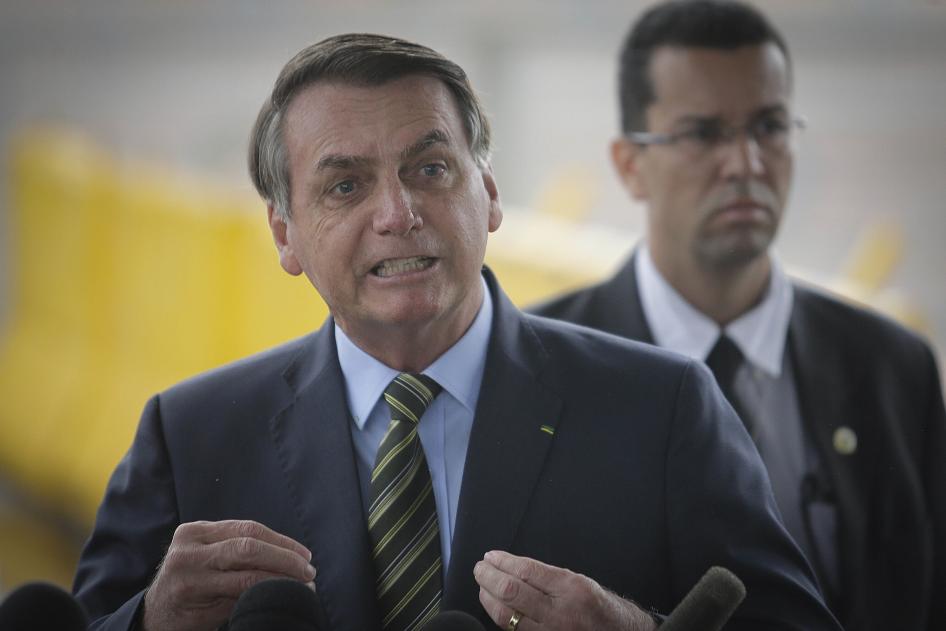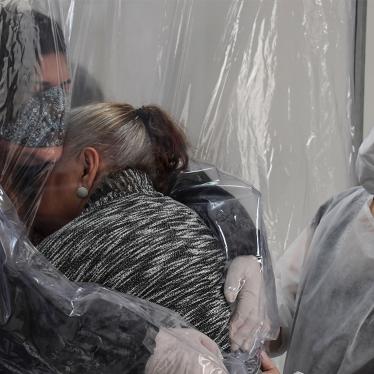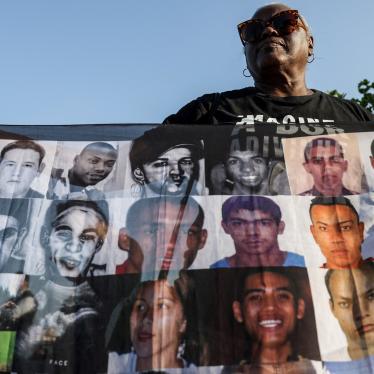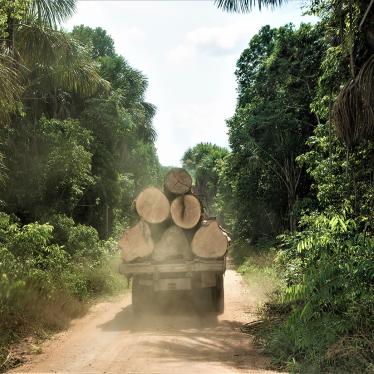(São Paulo, January 13, 2021) – President Jair Bolsonaro has tried to sabotage efforts to slow the spread of Covid-19 in Brazil and pursued other policies that undermine human rights, Human Rights Watch said today in its World Report 2021. The Supreme Court and other democratic institutions have often been forced to step in to protect these rights.
The Bolsonaro administration has promoted anti-rights policies on women’s rights and disability rights, has lashed out at reporters and civil society groups, and has weakened environmental law enforcement, effectively giving a green light to criminal networks that engage in illegal deforestation in the Amazon and threaten and attack forest defenders.
“President Bolsonaro has put the lives and health of Brazilians at great risk by trying to sabotage efforts to protect against the spread of Covid-19,” said Anna Livia Arida, Brazil Associate Director at Human Rights Watch. “The Supreme Court and other institutions have helped to protect Brazilians and to block many, although not all, of Bolsonaro’s anti-rights policies. They need to remain vigilant.”
In the 761-page World Report 2021, its 31st edition, Human Rights Watch reviews human rights practices in more than 100 countries. In his introductory essay, Executive Director Kenneth Roth argues that the incoming United States administration should embed respect for human rights in its domestic and foreign policy, in a way that is more likely to survive future US administrations that might be less committed to human rights. Roth emphasizes that even as the Trump administration mostly abandoned the protection of human rights, other governments stepped forward to champion rights. The Biden administration should seek to join, not supplant, this new collective effort.
President Bolsonaro downplayed Covid-19, which he called “a little flu” and disseminated misleading information.
Democratic institutions blocked some of his most damaging policies and stepped in to protect Brazilians.
The Supreme Court ruled against the Bolsonaro administration’s attempts to strip states of the authority to restrict people’s movements to contain the spread of Covid-19, to effectively suspend the access to information law, and to withhold Covid-19 data from the public.
Congress passed a bill forcing the government to provide emergency health care to Indigenous people, and the Supreme Court ordered the Bolsonaro administration to draft a plan to fight the spread of Covid-19 in Indigenous territories.
The Bolsonaro administration failed to address prison overcrowding, but the National Council of Justice (CNJ, in Portuguese), which regulates the functioning of the judicial system, asked judges to reduce pretrial detention during the pandemic and consider early release for certain detainees. As of September 16, judges had ordered nearly 53,700 people transferred to house arrest in response to Covid-19, according to official data. In addition, the Supreme Court annulled a presidential veto of a bill requiring the use of masks in detention facilities.
President Bolsonaro has failed to address police violence and has at times even encouraged it. In Rio de Janeiro – the state with the highest number of police killings – the Supreme Court suspended most raids in low-income neighborhoods during the pandemic, which led to a 70 percent drop in police killings from June to September, compared with the same period in 2019. Police killings went up in October, apparently after police increased the number of raids. Police killings fell again in November.
Brazilian independent broadcast and print media have also played an important role by continuing to inform the public, providing a forum for public debate, and serving as a check on government powers, despite the stigmatization, bullying, and threats of judicial action against them by the Bolsonaro administration.
But democratic institutions have been unable to curb President Bolsonaro’s anti-environmental policies and rhetoric, which have contributed to the destruction, from August 2019 to July 2020, of about 11,000 square kilometers of Amazon rainforest, the highest rate in 12 years. The number of fires in the Amazon went up by 16 percent in 2020. The smoke causes harmful levels of air pollution, which affect millions of residents.
Amazon fires are intentionally set to clear land, largely illegally. “President Bolsonaro’s policies have been a disaster for the Amazon rainforest and the people who defend it,” Arida said. “He blames Indigenous people, nongovernmental organizations, and local residents for environmental destruction, instead of acting against the criminal networks that are the driving force behind the lawlessness in the Amazon.”
Brazil: Institutions Stand Up to Bolsonaro
Weakened Enforcement Leads to Spike in Amazon Deforestation
Your tax deductible gift can help stop human rights violations and save lives around the world.
Region / Country
Most Viewed
-
April 24, 2024
EU Parliament Approves Supply Chain Law

-
April 23, 2024
UK’s Harmful Rwanda Bill to Become Law

-
November 25, 2019
A Dirty Investment

-
June 24, 2022
Q&A: Access to Abortion is a Human Right

-
April 27, 2021
A Threshold Crossed




